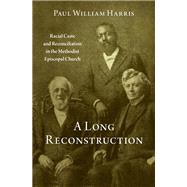A Long Reconstruction Racial Caste and Reconciliation in the Methodist Episcopal Church
, by Harris, Paul William- ISBN: 9780197571828 | 0197571824
- Cover: Hardcover
- Copyright: 4/15/2022
After slavery was abolished, how far would white America go toward including African Americans as full participants in the country's institutions? Conventional historical timelines mark the end of Reconstruction in the year 1877, but the Methodist Episcopal Church continued to wrestle with issues of racial inclusion for decades after political support for racial reform had receded. An 1844 schism over slavery split Methodism into northern and southern branches, but Union victory in the Civil War provided the northern Methodists with the opportunity to send missionaries and teachers into the territory that had been occupied by the Methodist Episcopal Church, South. To a remarkable degree, the M.E. Church succeeded in appealing to freed slaves and white Unionists and thereby built up a biracial membership far surpassing that of any other Protestant denomination.
A Long Reconstruction details the denomination's journey with unification and justice. African Americans who joined did so in a spirit of hope that through religious fellowship and cooperation they could gain respect and acceptance and ultimately assume a position of equality and brotherhood with whites. However, as segregation gradually took hold in the South, many northern Methodists evinced the same skepticism as white southerners about the fitness of African Americans for positions of authority and responsibility in an interracial setting. The African American membership was never without strong white allies who helped to sustain the Church's official stance against racial caste but, like the nation as a whole, the M.E. Church placed a growing priority on putting their broken union back together.
A Long Reconstruction details the denomination's journey with unification and justice. African Americans who joined did so in a spirit of hope that through religious fellowship and cooperation they could gain respect and acceptance and ultimately assume a position of equality and brotherhood with whites. However, as segregation gradually took hold in the South, many northern Methodists evinced the same skepticism as white southerners about the fitness of African Americans for positions of authority and responsibility in an interracial setting. The African American membership was never without strong white allies who helped to sustain the Church's official stance against racial caste but, like the nation as a whole, the M.E. Church placed a growing priority on putting their broken union back together.







